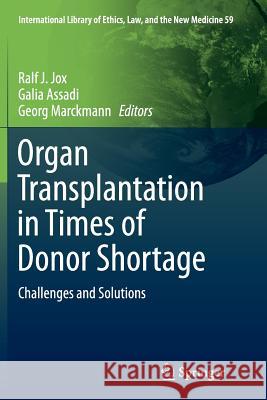Organ Transplantation in Times of Donor Shortage: Challenges and Solutions » książka



Organ Transplantation in Times of Donor Shortage: Challenges and Solutions
ISBN-13: 9783319347547 / Angielski / Miękka / 2016 / 352 str.
Organ Transplantation in Times of Donor Shortage: Challenges and Solutions
ISBN-13: 9783319347547 / Angielski / Miękka / 2016 / 352 str.
(netto: 383,36 VAT: 5%)
Najniższa cena z 30 dni: 385,52
ok. 22 dni roboczych.
Darmowa dostawa!
This book analyzes the reasons for organ shortage and ventures innovative ideas for approaching this problem.
1 Organ Transplantation in Times of Donor Shortage. An Introduction; Galia Assadi, Ralf J. Jox and Georg Marckmann.- Part I; The Ethics of Organ Donation: Foundations and Challenges.- 2 Brain Death, Justified Killing and the Zombification of Humans – Does the Transplantation Dilemma Require New Ways of Conceptualizing Life and Death?; Tobias Eichinger.- 3 Bodily Integrity as a Barrier to Organ Donation; Adrian M. Viens.- 4 The Role of Body Concepts for Donation Willingness. Insights from a Survey with German Medical and Economics Students; Sabine Wöhlke, Julia Inthorn and Silke Schicktanz.- 5 Foundations of a Duty to Donate Organs; Katherine Mendis.- 6 Why Altruism is not a Convincing Argument for Promoting Post-mortem Organ Donation: Responsibility and Solidarity as Key Concepts; Diana Aurenque.- 7 Why not Confiscate?; Christoph Schmidt-Petri.- 8 The Theological-Ethical Dimension of Organ Transplantation in the Context of Contemporary Discussions; Konrad Hilpert.- 9 How to be a Virtuous Recipient of a Transplant Organ; Barbro Fröding and Martin Peterson.- Part II The Law and Politics of Organ Donation: Problems and Solutions.- 10 Challenges to the Dead Donor Rule: Configuring a Biopolitical Response; Nathan Emmerich.- 11 Organ Donation and Transplantation in Germany; Thomas Breidenbach.- 12 Organ Shortage as a Structural Problem in Transplantation Medicine; Alexandra Manzei.- 13 Donation and Devolution: The Human Transplantation (Wales) Act 2012; Thomas Hayes.- 14 Advance Commitment: An Alternative Approach to the Family Veto Problem in Organ Procurement; Jurgen de Wispelaere and Lindsay Stirton.- 15 Power of Legal Concepts to Increase Organ Quantity; Ulrich Schroth and Karin Bruckmüller.- 16 Legal Consequences of Organ Transplantation Malpractice; Ruth Rissing-van Saan.- 17 Legal Justice in Organ Allocation. A Legal Perspective on the Failure of the German Organ Allocation System; Bijan Fateh-Moghadam.- 18 In Whose Best Interest? Questions Concerning the Weal and Woe of Transplant Patients; Sibylle Storkebaum.- Part III Alternative Answer to Organ Shortage:Xenotransplantation.- 19 Discordant Cellular and Organ Xenotransplantation – from Bench to Bedside; Bruno Reichart, Sonja Guethoff, Tanja Mayr, Michael Thormann, Stefan Buchholz, Jan-Michael Abicht, Alexander Kind and Paolo Brenner.- 20 Xenotransplantation: The Last Best Hope? Ethical Aspects of a Third Way to Solve the Problem of Organ Shortage; Galia Assadi, Lara Pourabdolrahim and Georg Marckmann.- 21 Xenotransplantation and Tissue Engineering Technologies: Safeguarding Their Prospects sans Sacrificing our Future; Jan-Ole Reichardt.- Part IV Crossing Borders:International and Intercultural perspectives.- 22 Is an Absolute Prohibition of Living Kidney Donation by Minors Appropriate? A Discussion of the Arguments in Favor and Against; Kristof Thys, Fabienne Dobbels, Paul Schotsmans, Pascal Borry.- 23 India’s Kidney Belt and Medical Tourism: a double-edged sword; Karen de Looze.- 24 Iran’s Experience on Living and Brain-Dead Organ Donation: A Critical Review; Kiarash Aramesh.- 25 The Norwegian Model. Full Utilisation of Both Living and Deceased Donors to Meet the Need for Organs; Per Pfeffer.- 26 The Spanish Model of Organ Donation and Transplantation; Rafael Matesanz and Beatriz Domínguez-Gil.- 27 The Business of Saving Lives. Organ Donation at OneLegacy in Southern California; Thomas Mone.- 28 The Ethics of Controlled Donation After Cardiac Death; Sohaila Bastami.- 29 Protocols for Uncontrolled Donation After Circulatory Death. The Thin Red Line Between Life (Resuscitation Attempts) and Death (Organ Retrieval After Circulatory Death); Ivàn Ortega-Deballon, David Rodríguez-Arias and Maxwell J. Smith.- List of contributors; Subject index.
This book analyzes the reasons for organ shortage and ventures innovative ideas for approaching this problem. It presents 29 contributions from a highly interdisciplinary group of world experts and upcoming professionals in the field. Every year thousands of patients die while waiting for organ transplantation. Health authorities, medical professionals and bioethicists worldwide point to the urgent and yet unsolved problem of organ shortage, which will be even intensified due to the increasing life expectancy. Even though the practical problem seems to be well known, the search for suitable solutions continues and often restricts itself by being limited through disciplinary and national borders. Combining philosophical reflection with empirical results, this volume enables a unique insight in the ethics of organ transplantation and offers fresh ideas for policymakers, health care professionals, academics, and the general public.
1997-2026 DolnySlask.com Agencja Internetowa
KrainaKsiazek.PL - Księgarnia Internetowa









